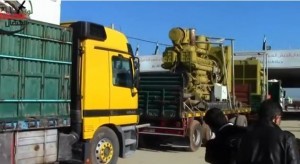The Theft of Deir El Zor’s Oil

Editor’s note: The editorial team has used only the first names of some of the interviewees and concealed the names of others for their own safety.
Rahif Ghanem*
The theft of crude oil is a rising phenomenon in the Syrian region of Deir El Zor, where predatory merchants and thieves have punctured oil pipelines to siphon off and then sell the oil. ‘Extracting’ oil in this way requires little effort, and most of those engaged in the practice do so openly.

The oil wells of Deir El Zor accounted for more than 200,000 of the 350,000 barrels of oil a day Syria produced before the start of the war.
Since the rebels seized control of the area, control of the lucrative resource has shifted to the armed opposition and their allies, but little if any revenue goes to help the people.
“[The people] see it as a continuation of the regime’s policy of the past forty years of stealing oil revenues,” said Abdul Karim, a local activist.
“The clouds of smoke that fill the sky above the Deir El Zor countryside are not caused by the regime forces’ bombing, nor the downing of military planes,” he went on. “It is the result of primitive refining of crude oil.”
This process involves setting the barrels over a fire and then increasing the heat gradually till it reaches a certain temperature, at which point the gasoline and diesel flow into two different tubes that lead to separate containers.
“Anyone can do it,” said Abdul Karim, adding that amateur oil refineries are currently operating in the areas of Deir El Zor, Raqqa, Hassaka, Aleppo and Idlib, leading all the way to Lattakia. “The lack of resources forces people to buy these derivatives, which can be used in heating and cooking, and are cheap and available.”
The profits gained from manually-refined crude oil encourage those who sell it to turn a blind eye to the disastrous health and environmental effects, which have appeared in these areas in the form of burns and suffocation.
One doctor who declined to be identified estimated that “dozens” of civilians had been killed as a result of amateur refining, either in refining accidents or due to the poor quality of the oil derivatives themselves. The chemicals also pose long-term health risks due to the presence of cancer-causing carcinogens.
“The gases produced by burning crude oil have a direct impact in some cases, while in other cases the effect [on one’s health] is cumulative, leading to a range of health problems in the digestive, respiratory and vascular systems,” he warned.
Haitham, a media activist, said only the small group that extracts and sells the oil benefits from the trade.
“The [opposition]armed groups that control the wells are selling some of the oil to the regime at mutually-agreed upon prices, some to Turkey, and some inside Syria,” said Haitham. “Every well is closely guarded by several [armed] elements including tanks and anti-aircraft machine guns.”
Haitham, for his part, opposes any form of exclusive control over the oil by a particular party or individual.
“Each opposition armed group battalion controls a certain well…and prevents anyone from approaching or threatening their control over it,” Haitham said.
The health and environmental damage seems almost secondary compared to the violence that erupts over control of the oil sources and revenues. Recently, fighting broke out between the Islamist Nusra Front and the tribesmen of Al Masrab on the Iraqi border over a stolen oil lorry. The fighting, which began towards the end of March and lasted 10 days, killed 37 people and destroyed about 30 houses in the town, according to the Syrian Observatory for Human Rights.
“A number of Free Syrian Army battalions claim that all oil revenues belong to them for the purchase of arms and ammunition,” said Mohammad, a member of a local council in the countryside of Deir El Zor. He went on to say that the council issued several decisions to try and prevent this illicit trade, but that it lacks the power to enforce them. Religious authorities have also issued a number of fatwas prohibiting the oil trade, but to little effect.
Qusay, a leader of an armed opposition group in the province of Deir El Zor, offered a different version, insisting that his group is trying to prevent interference with the pipeline, the wells and the theft of drilling equipment.
“Not only were the thieves stealing oil, but they also looted equipment for exploration, drilling, and transport, as well as hundreds of kilometres of pipeline,” he said. “We have set up roadblocks in the liberated areas to prevent oil smuggling and the theft of equipment and drilling rigs, which are the wealth of the nation and belong to all Syrians, and also must be preserved for their importance in the process of rebuilding the country after the regime is overthrown.”
He pointed to recent videos showing the transfer of heavy drilling equipment worth millions of dollars out of Syria, suggesting that both sides recognize the magnitude of the losses suffered by the sector, which are estimated to be in the hundreds of millions of dollars.
On April 22, the European Union passed a decision allowing member states to support the Syrian opposition by buying oil and oil derivatives, investing in export infrastructure and technology, and other forms of investment in the oil and gas industry in Syria.
The former head of the Syrian National Coalition, Ahmad Moaz al-Khatib, however, criticized the EU’s decision.
“Does the European Union do business with gangs?” he wrote in a statement posted to Facebook. “How can the national wealth to be sold by a known party to an unknown party? What political or executive authority will sign off on the sale of Syrian oil and [by doing so] participate in the looting of Syria’s wealth?”
* Rahif Ghanem is a pseudonym for a journalist living in Syria
